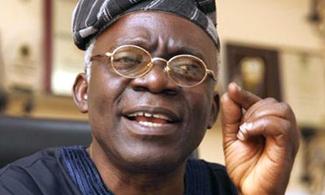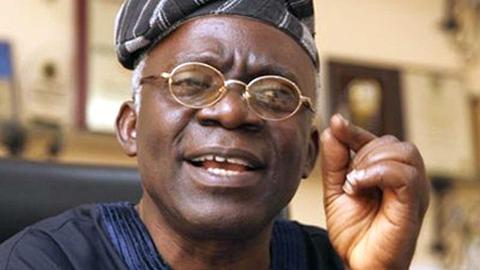
Human rights activist Femi Falana has warned that “Africa is being left behind in the global educational revolution,” arguing that, “The main pillar of knowledge in most emerging economies is to have access to knowledge. These economies produce knowledge, use knowledge to create innovations, and these innovations finally become tradable goods.”
Human rights activist Femi Falana has warned that “Africa is being left behind in the global educational revolution,” arguing that, “The main pillar of knowledge in most emerging economies is to have access to knowledge. These economies produce knowledge, use knowledge to create innovations, and these innovations finally become tradable goods.”
Falana made the comments in a paper titled The Politics Of Education In The Developing World: The African Perspective delivered as the 1st Convocation Lecture Of The West African Union University, Cotonou, Benin Republic on Saturday, January 26, 2018.
According to him, “It is undoubtedly clear that education in Africa has not benefited the people due to a number of factors. Educational authorities have failed to decolonize the content of the syllabus of education while the governments have refused to give priority to education. Consequently, there has been poor funding of the education which has resulted in lack of basic facilities and materials in schools.”
According to Falana, “while the rich have continued to educate their children in private schools at home and abroad the children of the poor have been left to attend public schools which are poorly equipped and poorly staffed. Thus, education is being used to widen the gap between the rich and the poor. Governments in Africa must remove children from the streets and enroll them in schools. Otherwise they will remain in the streets to commit crimes and cause political instability.”
The paper read in part: “For Africa to transform the neo-colonial and dependent economy in each of the countries to knowledge-based economy there has to be massive investment in education. In particular, the funding of science and technology should be given special attention while research should be well funded. The laws which have made education free and compulsory from primary ton secondary schools should be enforced while tertiary education should be subsidized by the governments.”

“Education is the cornerstone for Africa’s development. In today’s world the training of students in secondary education is vital for both formal and informal education for the onward transmission to building a knowledge economy, new challenges in life and for establishing a civic duty to society. Scholars have realized the need to make education relevant to Africa.”
“Over one-fifth of children between the ages of about 6 and 11 are out of school, followed by one-third of youth between the ages of about 12 and 14. According to UIS data, almost 60% of youth between the ages of about 15 and 17 are not in school.
“Tertiary education is critical for economic growth and national development. Nations all over the world have implemented educational ideals relevant to their national development needs. The increasing importance a knowledge economy in today’s world, and industrial change has made the quest for knowledge a determinant of economic and industrial growth.”
“The growth of knowledge has become a daily phenomenon. In discussing the politics of education in Africa, particular reference would be made broadly to Nigeria, and with particular reference to Tanzania, South Africa, Egypt and Benin considering, of course that it is rather impossible to chart this theme in respect of all African states—It will be a daunting task—Africa is too wide.”
“Education is both a human right in itself and an indispensable means of realizing other human rights. As an empowerment right, education is the primary vehicle by which economically and socially marginalized adults and children can lift themselves out of poverty and obtain the means to participate fully in their communities. Education has a vital role in empowering women, safeguarding children from exploitative and hazardous labour and sexual exploitation, promoting human rights and democracy, protecting the environment, and controlling population growth.”
“Increasingly, education is recognized as one of the best financial investments States can make. But the importance of education is not just practical: a well-educated, enlightened and active mind, able to wander freely and widely, is one of the joys and rewards of human existence. Knowledge and robust education are critical determinants for Africa’s socio-economic growth and standard of living.”
“It is also a perquisite the provision of infrastructures such as services which are needed for the development of national capacity building in both public sector, and private sectors. A vibrant tertiary educational programme and curriculum with an emphasis on research are needed for Africa states to transform into self-reliant nations and industrialized countries.”
“It may be informative to note that higher education is the main force shaping globalization and at the same time higher education is being remodelled by globalization. Higher education and knowledge are simultaneously leads to the assimilation of the economies of the world, and makes the nations of the world interdependent and interconnected.”
“Vibrant economies are usually not the result of amassing capital or petrol dollars, rather, they are a product of the foundation of a knowledge-based economy. Thus, it may now be clear that there is a new relationship that has emerged between education and the economy. The speed with which a nation develops is linked to its economic base. The underlying significance here is that all developed nations and a few developing nations are now talking of economic reforms to reflect the new role of higher education within the context of a knowledge-based economy.”
“With these few observations, it is worthy to note that this involves exploring the major issues related to economic development. How can higher educational institutions and systems transform technologies into new multi-faceted systems? How is information processed in an organized manner so as to achieve best results using cost-effective methods? How do our institutions of higher learning achieve virtual academies for imparting knowledge?”
“Africa in general faces overwhelming internal challenges compounded by the knowledge and information revolution. To overcome these challenges African governments must take on a new role to quickly exploit the knowledge revolution or forever be left in a dark abyssal of a brain drain generation with a strong army of dysfunctional, unemployed, unemployable, uneducated and confused population. Therefore, there is a dire need to create an economy that would cater for our ever increasing population.”
“Most jobs for our graduates are for low-skill industries. There has been a decline in high productivity agriculture and industrial advancement which is critical in knowledge-based economies. It seems that the purport and existence of oil producing countries in Africa is solely determined by crude oil. What happens when the world stops using crude oil due to new advancements in bio-fuels? What happens to the next generation? One solution out of many is by taking advantage of new knowledge. Before moving further, it is trite to understand the concept of education.”
“International human rights law guarantees individuals the right to education. The right to education is legally guaranteed for all individuals without any discrimination. The right to education is a foundation for building a knowledge economy. International human rights law guarantees the right to education."
“The right to education is also extended to women.The right to education for women is both an intrinsic right and a critical lever to reaching other development objectives. In spite of international accord on the need for the elimination of discrimination against women in respect of education, an appraised 35 million girls unable to attain basic education.”